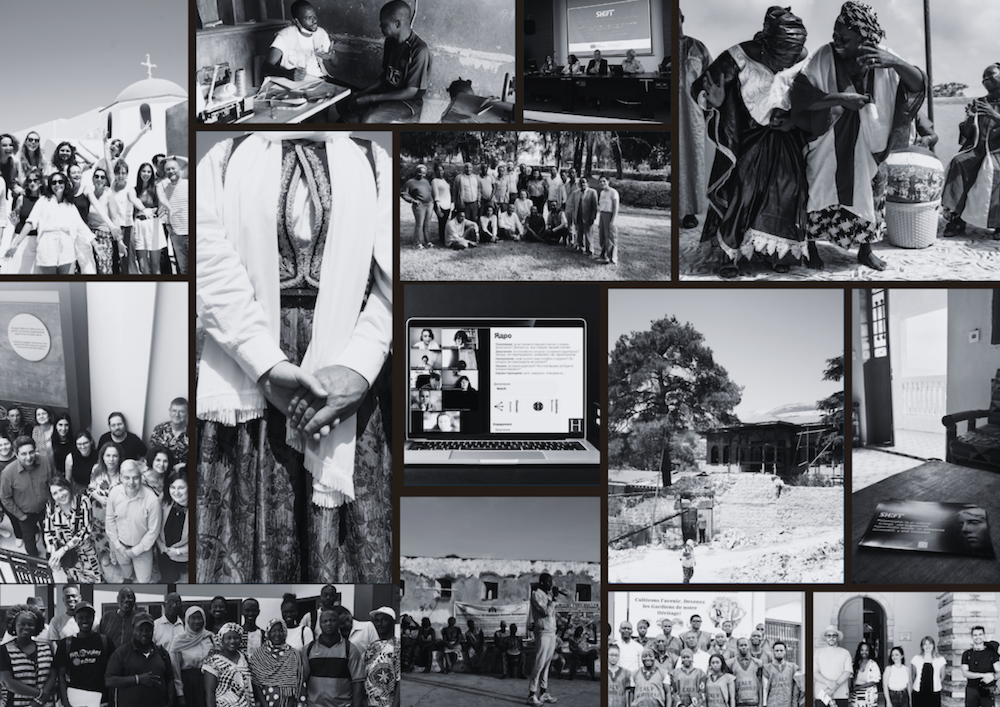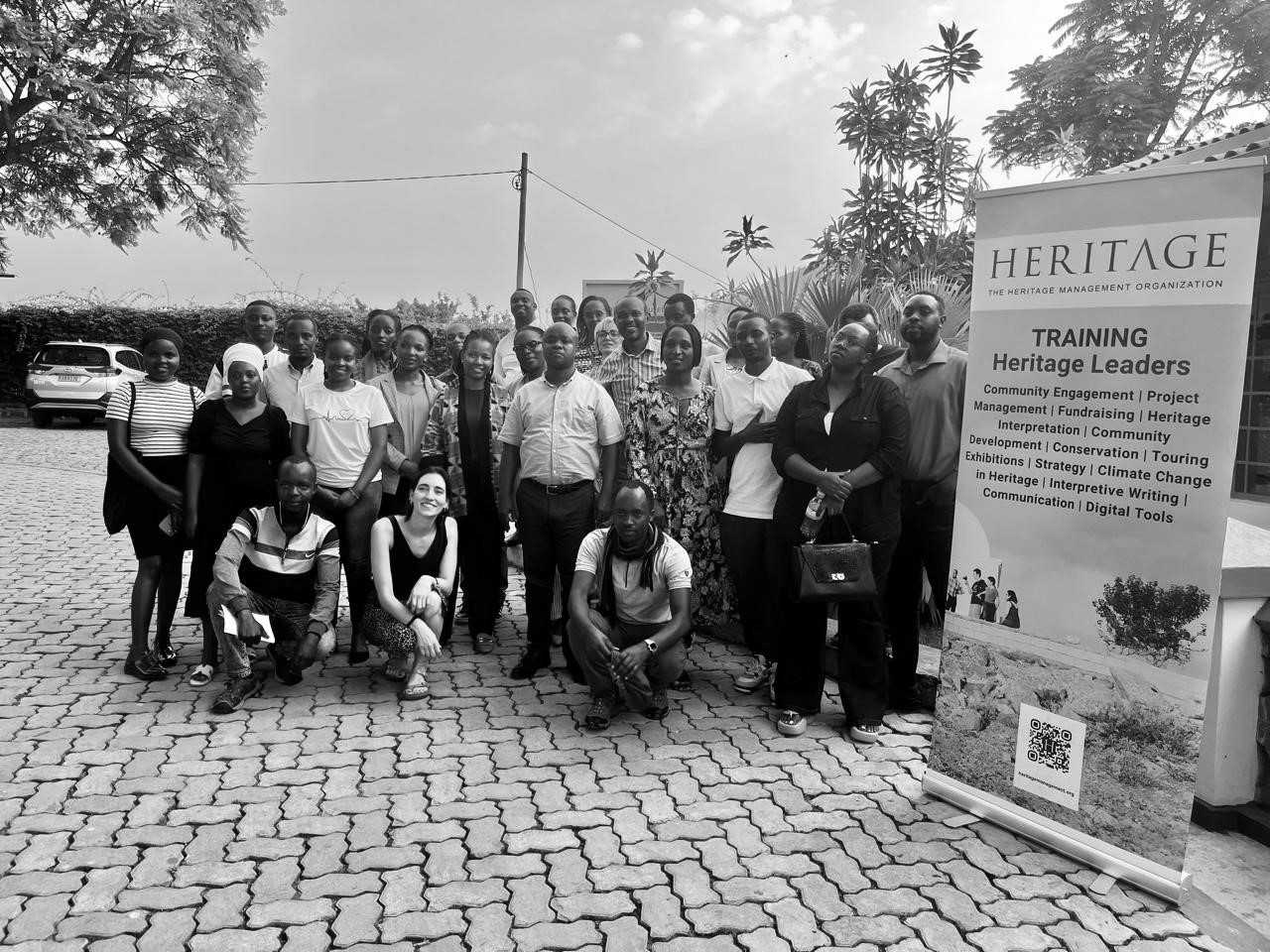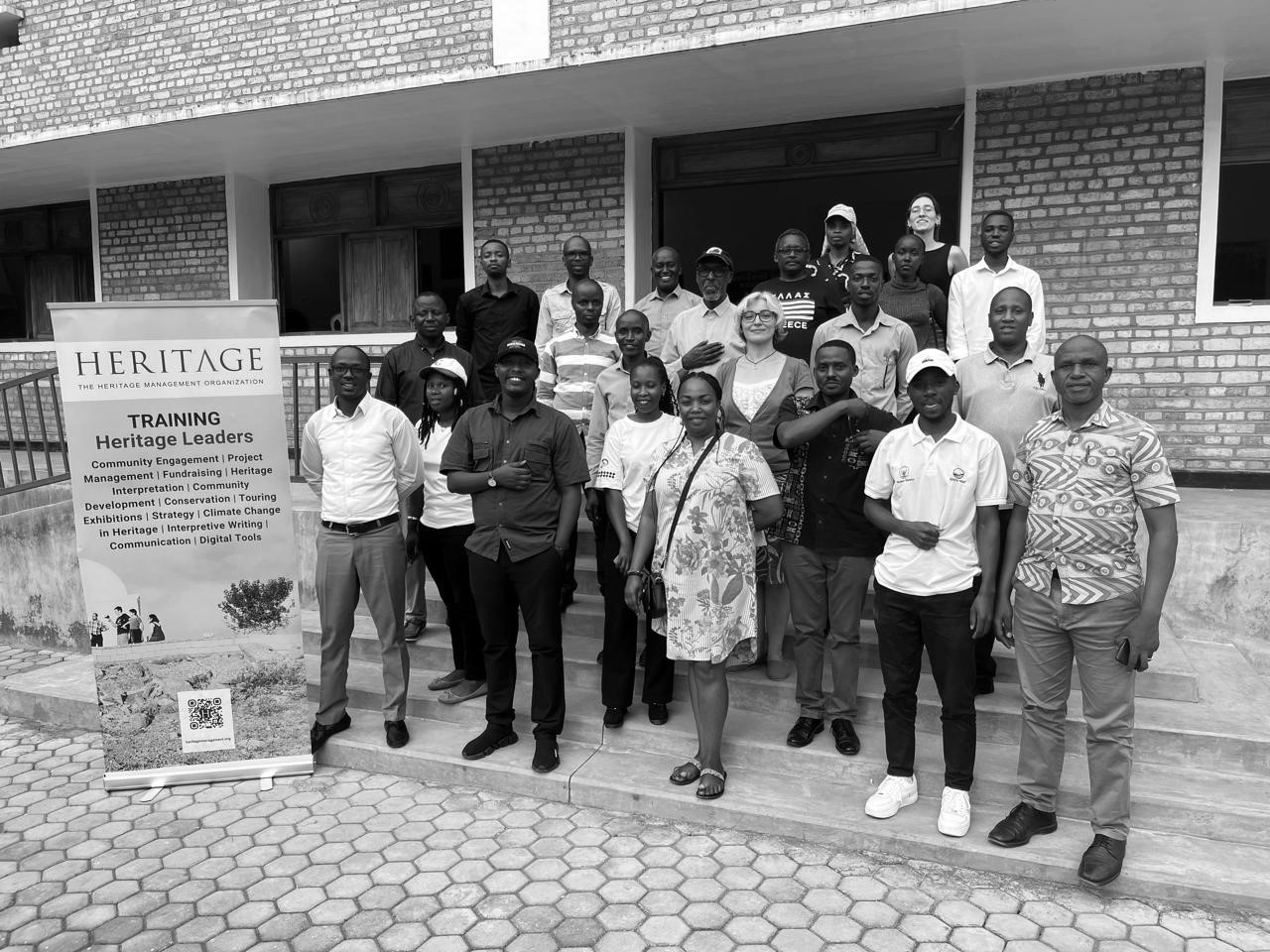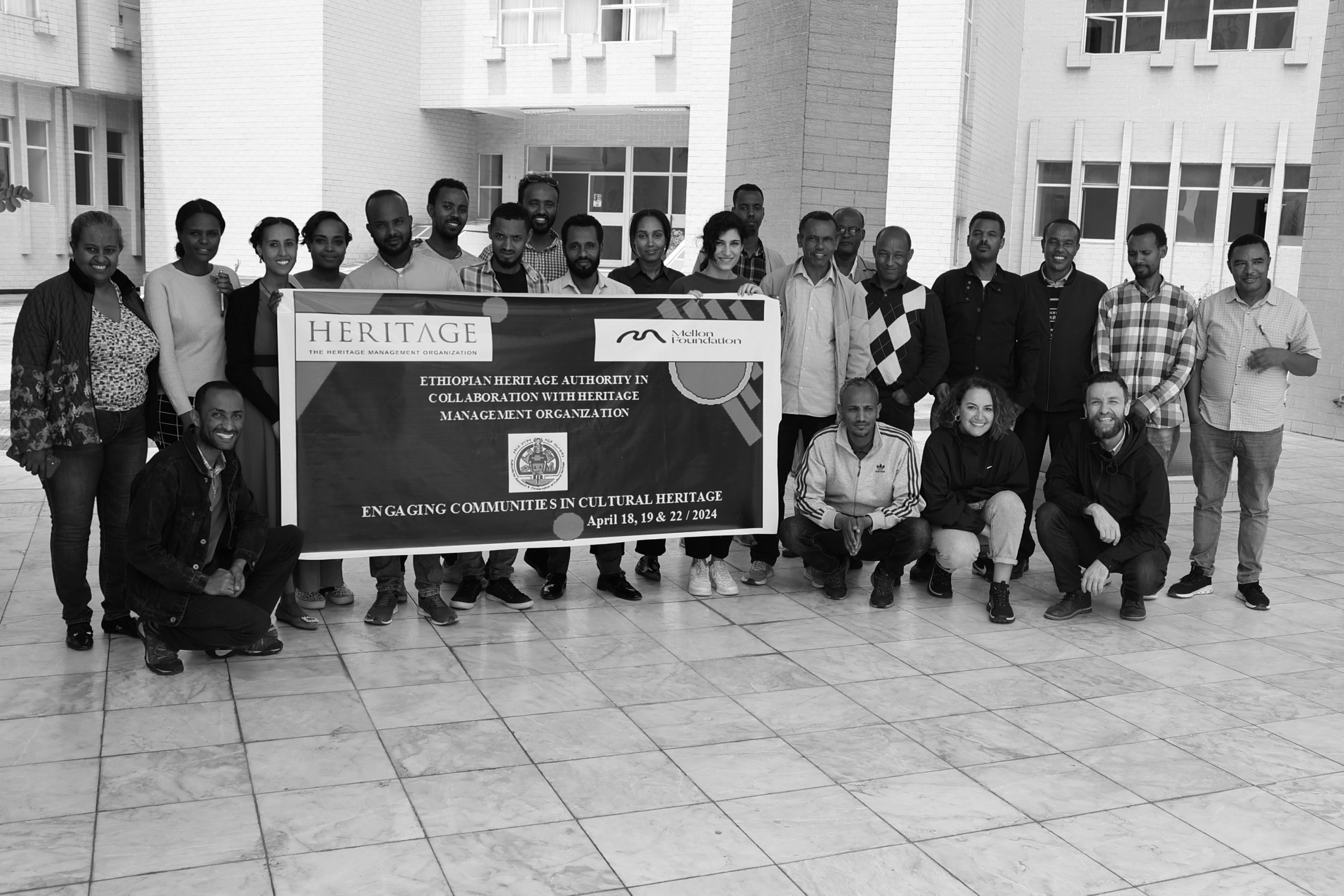Tag Archives: HerMaP Africa
HERITΛGE in the News
Our teams are working around the world to fulfill the HERITΛGE mission. Here is how some of our work has been featured in the press in the last few months.
Heritage Threatened by Conflict
HERITΛGE has launched a new project to safeguard Ukraine’s cultural heritage. Architectural Heritage Preservation in Times of War: The Ukrainian Model is being realized in cooperation with the Kharkiv School of Architecture and Skeiron, with generous support from the U.S. Embassy’s Public Diplomacy Section in Ukraine. The project has been featured in the latest issue of Popular Archaeology as well as in Ukrainian media.
HerMaP Gambia
The Gambia’s National Assembly’s Committee for Culture and Tourism recently embarked on a Parliamentary Study Tour in Thessaloniki. This visit, conducted as part of the HerMaP Gambia program co-funded by the European Union, was widely covered in the Gambian media, including prominent news programs and The Voice newspaper.
Watch the QTV bulletin (start at 14:18) or read the article in The Voice.
HERITΛGE also delivered workshops in The Gambia on various aspects of cultural management, including Festival Management, which was covered by The Voice.
African Heritage Grants
HERITΛGE’s small grants for African heritage initiative, supported by the Mellon Foundation, recently funded Restoring Ilukwe House, a project by the NGO Legacy to restore a historic building in Lagos’ railway compound. Coverage of this initiative appeared in Nigeria’s The Guardian.
The Republic, a Nigeria-based magazine and platform of socio-economic and political commentary, criticism and cultural discourse, has received a substantial grant from the Mellon Foundation to support its mission to establish itself as a regional, leading hub/platform for Black and Africa-focused ideas and critical perspectives; and to further connect Africa and the African diaspora on critical issues, with the help of HERITΛGE.
Greek Living Heritage Network
As a founding member of the Living Heritage Network in Greece, HERITΛGE continues to support and celebrate Greece’s living heritage. Theodosia Maroutsi recently discussed the Network on NaMaste, a cultural program on Greece’s national broadcaster ERA2.
Greek speakers can listen to the show here.
Heritage Interpretation In Rwanda
49 heritage professionals from Rwanda took part in two recent Introduction to Heritage Interpretation Workshops, led by HERITΛGE’s Valia Stergioti. The participants included officials from educational institutions, heritage sites, tourist businesses, local communities and NGOs.
During the workshop, which was led in person by HERITΛGE’s Valya Stergioti, they were introduced to the skills that allow heritage managers to transform mere phenomena into captivating experiences. They learned how to evoke a deep resonance within visitors at heritage sites of natural and/or cultural significance, guiding them towards profound insights and nurturing an appreciation for all aspects of heritage. Additionally, participants developed the ability to provide and receive constructive feedback to and from their peers.
The first of the two workshops was delivered in cooperation with the Rwanda Cultural Heritage Academy to 26 heritage and tourism professionals and took place on 24-26 July at the Rwanda Heritage Hub and the Kandt House Museum in Kigali.
“I learned to connect our participants to the site, which will help to increase our visitors satisfaction” said Esther Kakuze, Managing Director of ImuHira Ecotourism Rwanda who took part in the workshops.
“My project and institution will benefit through my professional practice,paying attention to all details related to heritage Management and community engagement,” said Wilhelm Mugiramahoro, Operations Officer for the Rwanda Cultural Heritage Academy.
The second workshop was delivered in cooperation with Nyanza District to 23 heritage and tourism professionals in the Nyanza District’s Visitor Centre.
“I have gained new skills as the heritage interpretation workshop was a new subject to me. I will use them so my visitors can enjoy our site and be our ambassadors, ” siad Sandrine Uwambayinkindi from the Girampuhwe Visitor Centre.
Both workshops are part of our HerMaP Africa program which is realised with the generous support of the Mellon Foundation’s Humanities in Place program.
26 new recipients of small grants for Africa
 HERITΛGE is very pleased to announce another 26 recipients of our HerMaP Africa small grants for organizations, groups, and individuals working with heritage in Africa. The small grants initiative is generously supported by the Mellon Foundation’s Humanities in Place program.
HERITΛGE is very pleased to announce another 26 recipients of our HerMaP Africa small grants for organizations, groups, and individuals working with heritage in Africa. The small grants initiative is generously supported by the Mellon Foundation’s Humanities in Place program.
In this second round of the program, over $333,000 has been awarded to projects that focus on the protection and promotion of local cultural and natural heritage and aim to contribute to the socio-economic development of local communities and beyond. HERITΛGE disbursed over $220,000 to 19 heritage projects in the first round of the small grants initiative earlier this year. By the end of 2024, a total of $1 million will have been awarded in small grants to African heritage projects.
“We are extremely pleased to announce this second round of small grant awards for African projects. We are already seeing what the scheme is doing to unlock the potential of heritage in Africa and make a difference for the development of local communities through the work undertaken by the first 19 grantees,” said HERITΛGE Director, Dr. Evangelos Kyriakidis. “Heritage has the ability to empower and we are already seeing local communities using our grants, in partnership with local organizations, to support sustainable development and safeguard local heritage for generations to come.”
The list of newly approved grants includes heritage projects from Algeria, Benin, Burkina Faso, Cameroon, the Democratic Republic of Congo, Ethiopia, The Gambia, Ghana, Kenya, Niger, Nigeria, South Africa, Sudan, Tanzania, Togo, Uganda, and Zambia.
To receive a small grant from the HerMaP Africa program, applicants have to demonstrate that their project has a lasting impact, develops capacity, builds networks, strengthens local skills, and has a strong, measurable impact for the protection of heritage and the benefit of local people.
A full list of the projects that have been awarded small grants can be found here.
Applications are still being accepted for the next round of small grants for heritage projects. To find out more and apply, visit our website: https://heritagemanagement.org/
About HerMaP-Africa: Made possible by a $5 million grant from the Mellon Foundation’s Humanities in Place program, HerMaP Africa aims to strengthen HERITΛGE’s Africa programs, fund initiatives that link heritage with socio-economic impact, develop the capacity of local organizations, and help them preserve African heritage and culture.
About The Andrew W. Mellon Foundation: The Andrew W. Mellon Foundation is the largest supporter of the arts and humanities in the United States. Since 1969, the Foundation has been guided by its core belief that the humanities and arts are essential to human understanding. The Foundation believes that the arts and humanities are where we express our complex humanity and that everyone deserves the beauty, transcendence, and freedom that can be found there. Through its grants, it seeks to build just communities enriched by meaning and empowered by critical thinking, where ideas and imagination can thrive. Learn more at mellon.org
2023- 2024: Our academic year in review
 On Saturday, June 30th, the HERITΛGE team wrapped up the 2023-2024 academic year with an event on the Greek island of Paros island to mark the end of our Community Engagement for Cultural Heritage Summer Field School. The event was the culmination of possibly the most successful academic year since the organization was founded 15 years ago.
On Saturday, June 30th, the HERITΛGE team wrapped up the 2023-2024 academic year with an event on the Greek island of Paros island to mark the end of our Community Engagement for Cultural Heritage Summer Field School. The event was the culmination of possibly the most successful academic year since the organization was founded 15 years ago.
During the last 12 months, HERITΛGE completed 40 training activities that included online and in-person workshops, two hybrid summer schools, and an academic Certificate program bearing ECTS credits, delivered in cooperation with HOGENT University in Belgium. Over 650 heritage managers and caretakers were trained in managing heritage assets, independent of project specifics.
We expanded our curriculum with a new conservation course, First Aid for Finds. The 3-day online workshop complements the Introduction to the General Principles of Cultural Heritage Conservation workshop we introduced in the academic year 2022-2023. In the past year, we also ran two successful pilot programs in Interpreting Heritage and Engaging Communities for Climate Change and in Community and Economic Development, focusing on community-based tourism. Both will form part of our 2024-2025 academic year training offerings.
We also expanded our partnership with the Mellon Foundation through our HerMaP Africa program, funded by the Foundation’s Humanities in Place initiative. Through HerMaP Africa we have already awarded 60 grants and 60 fellowships to heritage organizations and professionals across Africa. Through HerMaP Gambia, a program co-funded by the European Union, we continued to work to strengthen The Gambia’s heritage sector in order to contribute to the creation of more and better jobs for the country.
Thanks to the British Council, our project in Pakistan on the protection of Buddhist rock carvings in Swat (in partnership with the Italian Mission and EssaNoor Associates) has gotten off the ground. Our J.M. Kaplan Fund work in Iraq has been completed and so has our Creative Europe project in Ukraine, training heritage managers in digital storytelling for Ukrainian Museums – together with Ukrainian partners. Our cooperation with Aliph and local partners enabled us to contribute to the efforts to safeguard local heritage in the aftermath of last year’s catastrophic earthquakes in Turkey and Syria. This academic year we also helped create the Living Heritage Network which aims to bring together and empower all organizations and individuals working with Greek living heritage.
Meanwhile, we continued working with some of Europe’s best-known academic and research institutions as well as heritage organizations and private businesses to make cultural heritage more accessible and inclusive through SHIFT, a project funded by the European Union’s Horizon Europe program.
Finally, earlier in 2024 we started working on AHEAD, another Creative Europe program, this time aiming to strengthen European cultural heritage institutions’ audience development efforts.
These are most but by no means all the projects our team is working on, all the while expanding HERITΛGE’s impact and outreach efforts. Stay tuned for more!
Giving Ethiopian Heritage Managers the Tools to Engage Local Communities
In April, HERITAGE traveled to Ethiopia for a series of training activities, including a 3-day workshop in Engaging Communities in Cultural Heritage, delivered in person to 23 heritage managers in Addis Ababa; 22 officials from the Ethiopian Heritage Authority, and one from the Wako Gutu Foundation.
The workshop was led by Drs. Lena Stefanou and Aris Anagnostopoulos and focused on community engagement as one of the key strategies for preserving Ethiopia’s rich cultural heritage.
Through interactive sessions and real-world case studies, workshop participants explored how to identify communities, understand their needs and capacities, and develop effective engagement plans.
The workshop employed a participatory approach, blending theoretical frameworks with practical exercises. On day 1, participants focused on defining communities, collaboration strategies, and best practices. They identified real-life projects and engaged in group discussions to analyze community engagement strategies. The second day was devoted to audience development and segmentation. The group explored the concept of non-audience and strategies for engaging least engaged groups. Participants developed audience engagement plans and focused activities in team settings. The final day was focused on oral history methods and techniques, with participants learning more about interviews and archiving techniques and taking part in an immersive role-playing exercise that allowed them to practice interview skills and draft sample interview guides.
The training’s participatory approach and focus on real-life projects ensured its relevance and effectiveness, with participants saying they found the presentation insightful and adding that the workshop proved a collaborative effort that enriched their understanding of cultural heritage and community engagement.
This workshop was part of our HerMaP Africa program which is generously supported by the Mellon Foundation.
Preserving Africa’s Rich Heritage: Our Initiatives
As the world celebrates African Heritage Day on May 5th, we highlight our initiatives aimed at conserving, preserving, and promoting Africa’s diverse cultural legacy. The Heritage Management Organization (HERITΛGE), in collaboration with the Mellon Foundation and the European Union, stands at the forefront of conservation and community engagement, catalyzing efforts to safeguard and celebrate Africa’s invaluable natural and cultural heritage. Here are three important ways HERITΛGE is currently contributing to the preservation and promotion of African Heritage
- HerMaP Africa: HERITΛGE, in partnership with the Mellon Foundation, has embarked on a mission to fortify its country-specific programs across the African continent. A substantial $5 million grant, with support from the Mellon Foundation’s Humanities in Place program, has been instrumental in empowering local organizations and enhancing their capacity to preserve heritage and culture. Notably, Ethiopia, Ghana, and Rwanda, among other regions, benefit from this collaborative effort through initiatives like HERITΛGE’s HerMaP Gambia program. This funding injection includes $1 million allocated for small grants to African organizations and a $450,000 fellowship program aimed at nurturing heritage leaders. Such initiatives not only safeguard Africa’s cultural treasures but also foster socio-economic development, ensuring that heritage remains a vibrant force for progress.
- Africa Grants Program: HERITΛGE is proud to announce the launch of its Africa Grants Program, designed to support grassroots heritage projects across the continent. Ranging from $5,000 to $50,000, these small grants target organizations, groups, and individuals committed to preserving and promoting local heritage for socio-economic development. This initiative, part of the broader HerMaP-Africa project, is made possible through the generous backing of the Mellon Foundation’s Humanities in Place program. We have already allocated the first 19 grants and are on track to announce at least 30 more by the end of 2024. By empowering local stakeholders and fostering community-led initiatives, the Africa Small Grants Program not only safeguards Africa’s cultural tapestry but also nurtures its potential as a driver of sustainable development.
- HerMaP Gambia: In a groundbreaking collaboration co-funded by the European Union, HERITΛGE spearheads the HerMaP Gambia initiative, aimed at elevating the cultural and creative industries within The Gambia. Since its inception in 2020, HerMaP Gambia has served as a beacon of progress, harnessing the power of culture to catalyze social and economic advancement. At its core, HerMaP Gambia seeks to enrich the understanding and appreciation of Gambian cultural heritage while enhancing the capacity of key stakeholders in the cultural sector. By nurturing the management and appreciation of Gambian cultural heritage, this initiative paves the way for sustainable socio-economic growth, creating avenues for job creation and community development.
As we commemorate African Heritage Day, let us recognize the tireless efforts of local communities in Africa and their supporters to steward and harness the continent’s amazing heritage. Through collaborative initiatives, targeted grants, and visionary programs, cultural treasures are safeguarded and their potential is unlocked to catalyze progress and prosperity across the African continent. Together, let us celebrate and protect the invaluable legacy of Africa’s diverse heritage for generations to come.





